Unit 11 Conflict And Compromise Lesson 1 Grammar 课件(共27张) 2024-2025学年高二英语北师版(2019)选择性必修4
文档属性
| 名称 | Unit 11 Conflict And Compromise Lesson 1 Grammar 课件(共27张) 2024-2025学年高二英语北师版(2019)选择性必修4 | 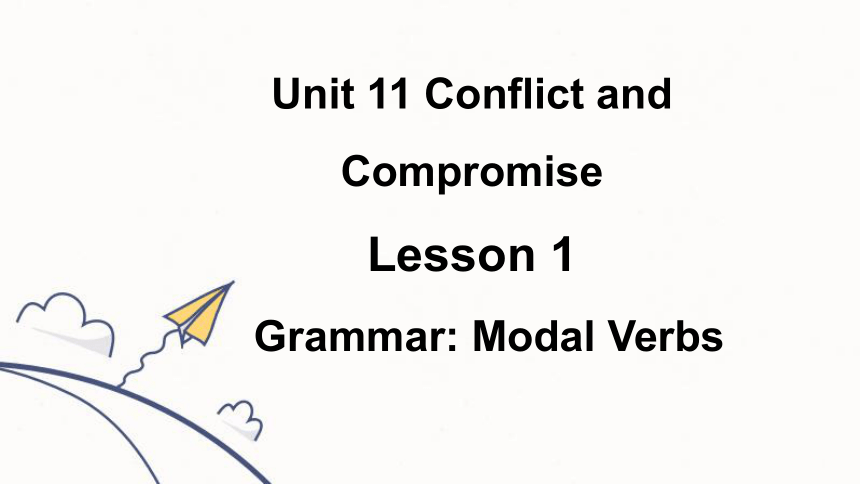 | |
| 格式 | pptx | ||
| 文件大小 | 1.9MB | ||
| 资源类型 | 教案 | ||
| 版本资源 | 北师大版(2019) | ||
| 科目 | 英语 | ||
| 更新时间 | 2025-04-29 18:16:29 | ||
图片预览

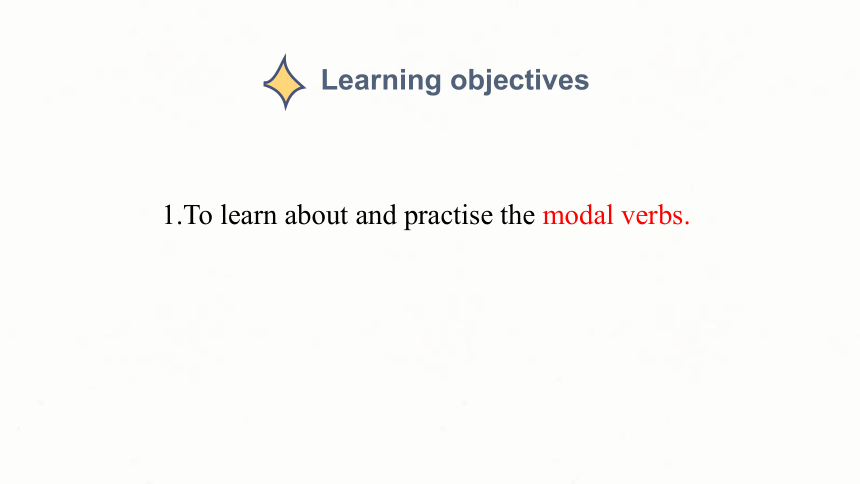
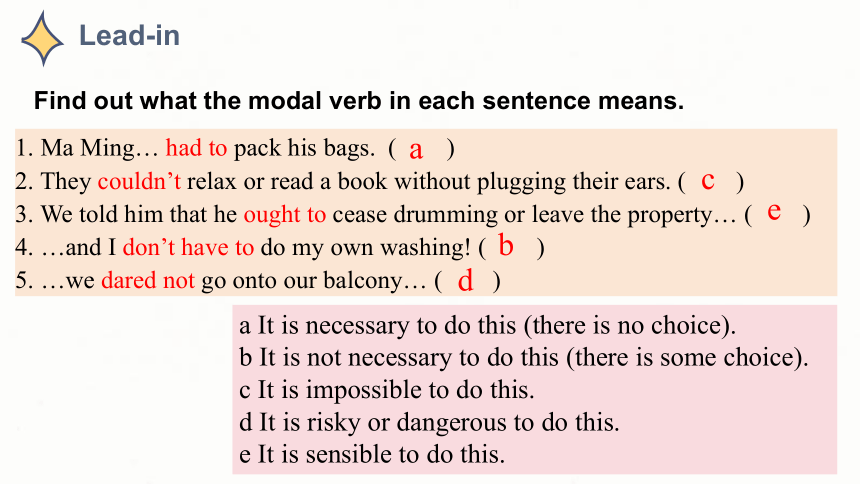
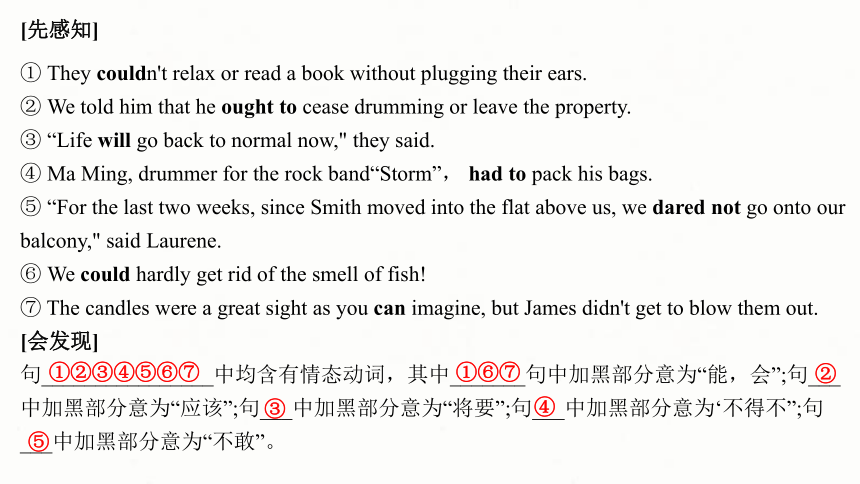
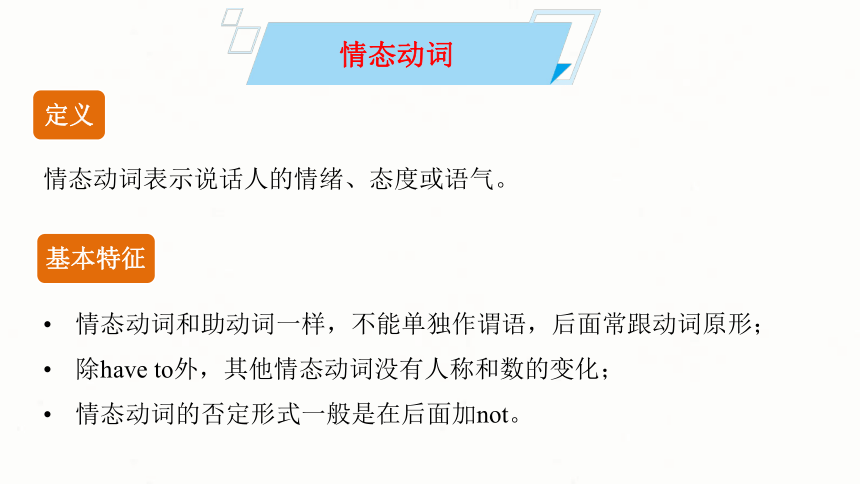
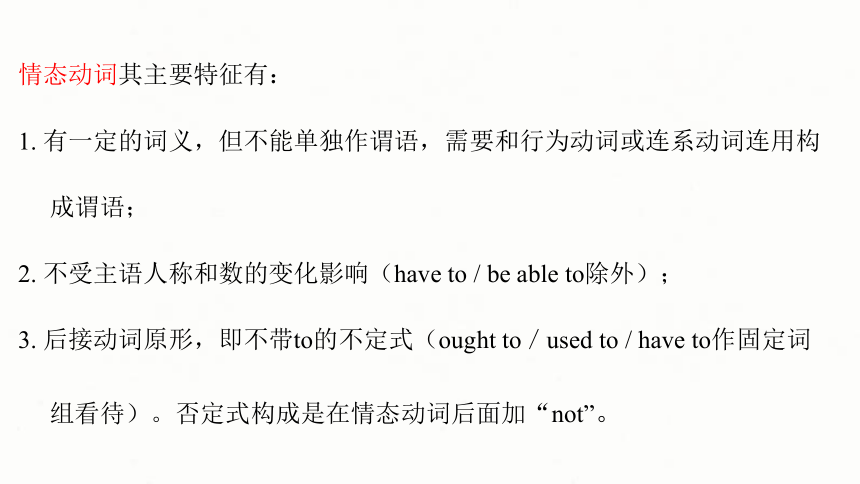
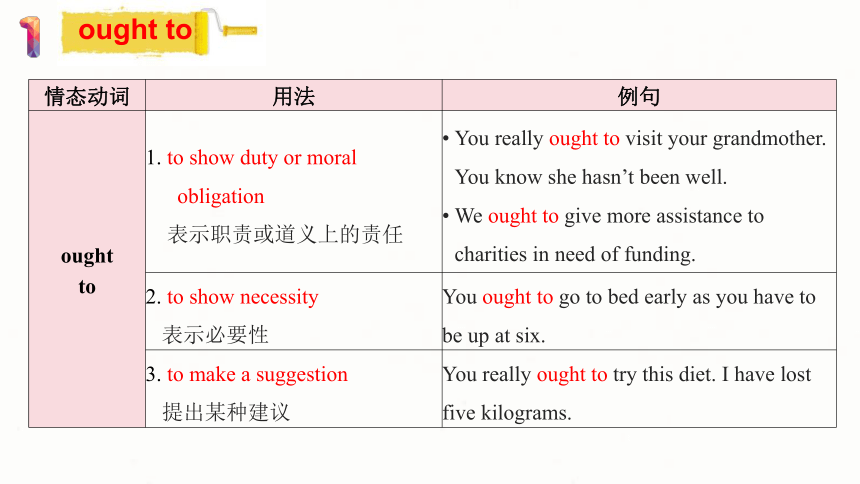
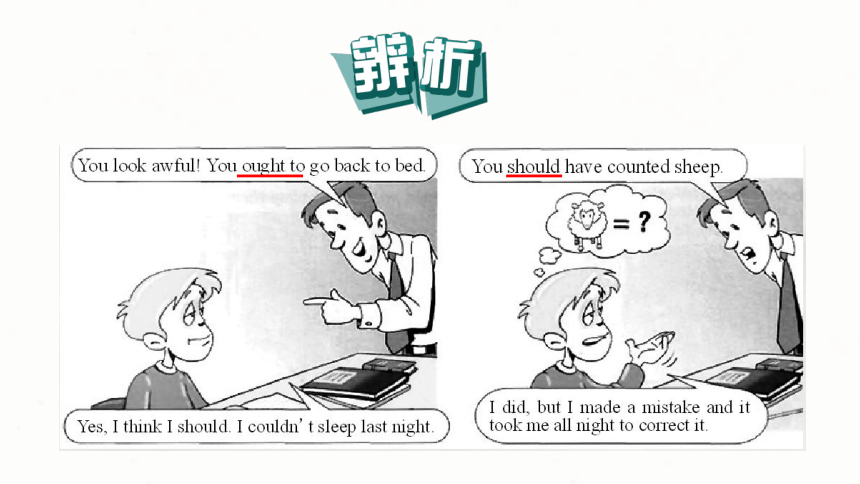
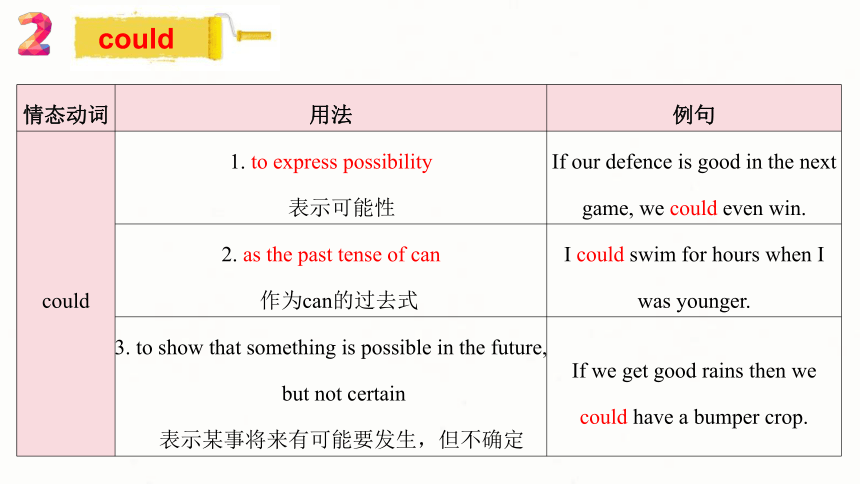
文档简介
(共27张PPT)
Unit 11 Conflict and Compromise
Lesson 1
Grammar: Modal Verbs
1.To learn about and practise the modal verbs.
Learning objectives
Find out what the modal verb in each sentence means.
1. Ma Ming… had to pack his bags. ( )
2. They couldn’t relax or read a book without plugging their ears. ( )
3. We told him that he ought to cease drumming or leave the property… ( )
4. …and I don’t have to do my own washing! ( )
5. …we dared not go onto our balcony… ( )
a It is necessary to do this (there is no choice).
b It is not necessary to do this (there is some choice).
c It is impossible to do this.
d It is risky or dangerous to do this.
e It is sensible to do this.
a
c
e
b
d
Lead-in
① They couldn't relax or read a book without plugging their ears.
② We told him that he ought to cease drumming or leave the property.
③ “Life will go back to normal now," they said.
④ Ma Ming, drummer for the rock band“Storm”, had to pack his bags.
⑤ “For the last two weeks, since Smith moved into the flat above us, we dared not go onto our balcony," said Laurene.
⑥ We could hardly get rid of the smell of fish!
⑦ The candles were a great sight as you can imagine, but James didn't get to blow them out.
[会发现]
句________________中均含有情态动词,其中_______句中加黑部分意为“能,会”;句___中加黑部分意为“应该”;句___中加黑部分意为“将要”;句___中加黑部分意为‘不得不”;句___中加黑部分意为“不敢”。
①②③④⑤⑥⑦
①⑥⑦
②
③
④
⑤
[先感知]
定义
情态动词表示说话人的情绪、态度或语气。
基本特征
情态动词和助动词一样,不能单独作谓语,后面常跟动词原形;
除have to外,其他情态动词没有人称和数的变化;
情态动词的否定形式一般是在后面加not。
情态动词
情态动词其主要特征有:
1. 有一定的词义,但不能单独作谓语,需要和行为动词或连系动词连用构成谓语;
2. 不受主语人称和数的变化影响(have to / be able to除外);
3. 后接动词原形,即不带to的不定式(ought to/used to / have to作固定词组看待)。否定式构成是在情态动词后面加“not”。
情态动词 用法 例句
ought to 1. to show duty or moral obligation 表示职责或道义上的责任 You really ought to visit your grandmother. You know she hasn’t been well.
We ought to give more assistance to charities in need of funding.
2. to show necessity 表示必要性 You ought to go to bed early as you have to be up at six.
3. to make a suggestion 提出某种建议 You really ought to try this diet. I have lost five kilograms.
ought to
情态动词 用法 例句
could 1. to express possibility 表示可能性 If our defence is good in the next game, we could even win.
2. as the past tense of can 作为can的过去式 I could swim for hours when I was younger.
3. to show that something is possible in the future, but not certain 表示某事将来有可能要发生,但不确定 If we get good rains then we could have a bumper crop.
could
情态动词 用法 例句
could 4. as a polite or formal way of asking someone to do something or to ask for permission to do something 礼貌地或正式地请求他人做某事或请求允许做某事 Could you pass me the salt, please
Could I ask you a question
Could you run up to the office and deliver this message, please
情态动词 用法 例句
could 5. to show that something is / was possible now or at some time in the past 表示某事在现在或过去的某个时间里可能发生 It is so relaxing that I could just sit in the sun and read all day.
I was so hungry that I could have eaten the whole cake!
6. as a suggestion when asked what to 在被问起要做某事时,表示建议 We could go to Chen Xi’s house first and then go on to the game.
情态动词 用法 例句
dare to We use dare to to say we are brave enough to do something. dare to表示敢于做某事。 Only the fittest long-distance runners dare to tackle the Comrades Marathon.
I was so worried about my exam results that I didn’t dare to ask if I had passed.
Only a few journalists dared to cover the story.
dare to
have to
情态动词 用法 例句
have to 1. to show obligation (which someone else expects of us) 表示(他人期望我们履行的) 责任、义务 Do you have to go to bed at nine every night
Do you have to go to school tomorrow
I have to go to the dentist tomorrow.
2. to give advice 提建议 You have to see the film version of the book; you’ll love it.
情态动词 用法 例句
have to 3. to say it is important that something happens 表示某事的重要性 We have to use cold water for the pastry, otherwise it will become tough.
情态动词 用法 例句
don’t have to We use don’t have to to express a lack of obligation. 用don’t have to表示不必履行职责、义务。 We don’t have to wear a uniform at our school.
don’t have to
may, might, can, could
In affirmative sentences, may, could, might can be used to say there is a possibility of something happening or being true, but not can. Might can suggest that there is less possibility.
在肯定句中,may, could, might用于表示某事可能发生或可能存在,但can不能用于此目的。might表示可能性很小。
eg It may/ might/ could snow later in the day.
According to the weather report, it may rain today. It might even snow.
Can is used to talk about a more general possibility of something happening.
can用来表示更宽泛的某事发生的可能性。
eg Too much snow can cause trouble.
In negative sentences, we use cannot or couldn’t to say that something is not the case.
在否定句中,用cannot或者couldn’t表示“不可能”。
eg It can’t / couldn’t be Jack. He said he wouldn’t talk to me any more.
Can is used in questions.
can用于问句。
eg There is a knock at the door. Who can it be at this time of the night
We can use might / could + have done to say that something was possible in the past, but we know that it did not in fact happen. In this case we can’t use may or can.
might / could + have done用于表示某事可能在过去发生,但事实上并没有发生。
may和can不能用于此种情况。
eg If you went to school on foot this morning, you could / might have avoided the accident.
must have done 一定已经做了…… 用于肯定句中,表示对过去的肯定情况把握比较大的推测
should /ought to have done 本该做某事(而实际上未做) 可用于肯定句和否定句,表示责备或惋惜之情
shouldn’t / oughtn’t to have done 本不该做某事而实际上做了 表示责备或惋惜之情
needn’t have done 本不必做某事(而实际上做了)
eg Yesterday was the deadline, and he should have completed his work.
Tom oughtn’t to have told me your secret, but he meant no harm.
— Catherine, I have cleaned the room for you.
— Thanks. You needn’t have done it. I could manage it.
表示推测时,“情态动词+have done”和“情态动词+do”的显著区别在于:
前者表示过去的、有结果的事情,后者表示对现在或将来的推测。
Exercise
Complete the text with the correct form of could, have to, ought to or dare not (to).
My good friend, Kathy, was a hard-working person. She shared a flat with me ten months ago. At that time, she was preparing for an important exam. During the day, she 1. __________ go to work. So she 2. __________ only study in the evening. To help her get focused, I 3. _________ turn on the TV loud as she always studied late. I think she 4. __________ have enough sleep.
had to
could
dared not
ought to
Complete the text with the correct form of could, have to, ought to or dare not (to).
Now Kathy has passed the exam and moved out to live near her new company. Surprisingly, I sometimes feel afraid to be alone in the flat at night and 5. __________ without the light on now.
dare not
Exercise
用适当的情态动词或所给词的适当形式填空
1. Chris _____ go to the opera on Sunday because he is going to have a meeting.
2. Sometimes it ____________ helpful to use examples to explain abstract concepts.
3. Taking up a job that is worth doing______ give people mental satisfaction.
4. David, ________ you please sweep the floor and take out the trash
5. However, you _______ also decide for yourself what kind of books to read.
6. It was an easy test and he _____________________(pass), but he didn't.
7. He ______________(done) it all by himself for there was no one else in the house to turn to for help.
8. An improvement in living standards________be years away.
9. They all said that he _________come home before the Spring Festival.
10. I _______________(work) out the problem, but I was too nervous.
can't
might/maybe
can
could
must
should have passed
must have done
could
might
could have worked
1. can/could 表示能力表示推测/请求或许可/理论上的可能性/惊异、 怀疑、不相信等态度;(用于否定句或疑问句); 用于固定结构中
2. may/might 表示请求或许可(用于疑问句)/表示推测/表示祝愿(may用于祈使句); 用于固定结构
3. must 表示义务、命令等/表示肯定的推测/表示禁止(用于否定句/表示“偏要,非要……不可”
4. have to 表示由于客观原因而不得不做某事
5. shall表示征求对方的意见或向对方请示/表示说话人的命令、 警告、 许诺或威胁等; 用于条约、规定、法令、法律等
6. should/ought to表示责任、义务、劝告、建议等/惊讶、意外/表示说话人根据一定的情况作出推测
7. will/would 表示意志、愿望或决定/请求或要求/规律性的“注定会”
8. need/dare 常用于疑问句和否定句
Summary
Make up a conversation using modal verbs.
Homework
Unit 11 Conflict and Compromise
Lesson 1
Grammar: Modal Verbs
1.To learn about and practise the modal verbs.
Learning objectives
Find out what the modal verb in each sentence means.
1. Ma Ming… had to pack his bags. ( )
2. They couldn’t relax or read a book without plugging their ears. ( )
3. We told him that he ought to cease drumming or leave the property… ( )
4. …and I don’t have to do my own washing! ( )
5. …we dared not go onto our balcony… ( )
a It is necessary to do this (there is no choice).
b It is not necessary to do this (there is some choice).
c It is impossible to do this.
d It is risky or dangerous to do this.
e It is sensible to do this.
a
c
e
b
d
Lead-in
① They couldn't relax or read a book without plugging their ears.
② We told him that he ought to cease drumming or leave the property.
③ “Life will go back to normal now," they said.
④ Ma Ming, drummer for the rock band“Storm”, had to pack his bags.
⑤ “For the last two weeks, since Smith moved into the flat above us, we dared not go onto our balcony," said Laurene.
⑥ We could hardly get rid of the smell of fish!
⑦ The candles were a great sight as you can imagine, but James didn't get to blow them out.
[会发现]
句________________中均含有情态动词,其中_______句中加黑部分意为“能,会”;句___中加黑部分意为“应该”;句___中加黑部分意为“将要”;句___中加黑部分意为‘不得不”;句___中加黑部分意为“不敢”。
①②③④⑤⑥⑦
①⑥⑦
②
③
④
⑤
[先感知]
定义
情态动词表示说话人的情绪、态度或语气。
基本特征
情态动词和助动词一样,不能单独作谓语,后面常跟动词原形;
除have to外,其他情态动词没有人称和数的变化;
情态动词的否定形式一般是在后面加not。
情态动词
情态动词其主要特征有:
1. 有一定的词义,但不能单独作谓语,需要和行为动词或连系动词连用构成谓语;
2. 不受主语人称和数的变化影响(have to / be able to除外);
3. 后接动词原形,即不带to的不定式(ought to/used to / have to作固定词组看待)。否定式构成是在情态动词后面加“not”。
情态动词 用法 例句
ought to 1. to show duty or moral obligation 表示职责或道义上的责任 You really ought to visit your grandmother. You know she hasn’t been well.
We ought to give more assistance to charities in need of funding.
2. to show necessity 表示必要性 You ought to go to bed early as you have to be up at six.
3. to make a suggestion 提出某种建议 You really ought to try this diet. I have lost five kilograms.
ought to
情态动词 用法 例句
could 1. to express possibility 表示可能性 If our defence is good in the next game, we could even win.
2. as the past tense of can 作为can的过去式 I could swim for hours when I was younger.
3. to show that something is possible in the future, but not certain 表示某事将来有可能要发生,但不确定 If we get good rains then we could have a bumper crop.
could
情态动词 用法 例句
could 4. as a polite or formal way of asking someone to do something or to ask for permission to do something 礼貌地或正式地请求他人做某事或请求允许做某事 Could you pass me the salt, please
Could I ask you a question
Could you run up to the office and deliver this message, please
情态动词 用法 例句
could 5. to show that something is / was possible now or at some time in the past 表示某事在现在或过去的某个时间里可能发生 It is so relaxing that I could just sit in the sun and read all day.
I was so hungry that I could have eaten the whole cake!
6. as a suggestion when asked what to 在被问起要做某事时,表示建议 We could go to Chen Xi’s house first and then go on to the game.
情态动词 用法 例句
dare to We use dare to to say we are brave enough to do something. dare to表示敢于做某事。 Only the fittest long-distance runners dare to tackle the Comrades Marathon.
I was so worried about my exam results that I didn’t dare to ask if I had passed.
Only a few journalists dared to cover the story.
dare to
have to
情态动词 用法 例句
have to 1. to show obligation (which someone else expects of us) 表示(他人期望我们履行的) 责任、义务 Do you have to go to bed at nine every night
Do you have to go to school tomorrow
I have to go to the dentist tomorrow.
2. to give advice 提建议 You have to see the film version of the book; you’ll love it.
情态动词 用法 例句
have to 3. to say it is important that something happens 表示某事的重要性 We have to use cold water for the pastry, otherwise it will become tough.
情态动词 用法 例句
don’t have to We use don’t have to to express a lack of obligation. 用don’t have to表示不必履行职责、义务。 We don’t have to wear a uniform at our school.
don’t have to
may, might, can, could
In affirmative sentences, may, could, might can be used to say there is a possibility of something happening or being true, but not can. Might can suggest that there is less possibility.
在肯定句中,may, could, might用于表示某事可能发生或可能存在,但can不能用于此目的。might表示可能性很小。
eg It may/ might/ could snow later in the day.
According to the weather report, it may rain today. It might even snow.
Can is used to talk about a more general possibility of something happening.
can用来表示更宽泛的某事发生的可能性。
eg Too much snow can cause trouble.
In negative sentences, we use cannot or couldn’t to say that something is not the case.
在否定句中,用cannot或者couldn’t表示“不可能”。
eg It can’t / couldn’t be Jack. He said he wouldn’t talk to me any more.
Can is used in questions.
can用于问句。
eg There is a knock at the door. Who can it be at this time of the night
We can use might / could + have done to say that something was possible in the past, but we know that it did not in fact happen. In this case we can’t use may or can.
might / could + have done用于表示某事可能在过去发生,但事实上并没有发生。
may和can不能用于此种情况。
eg If you went to school on foot this morning, you could / might have avoided the accident.
must have done 一定已经做了…… 用于肯定句中,表示对过去的肯定情况把握比较大的推测
should /ought to have done 本该做某事(而实际上未做) 可用于肯定句和否定句,表示责备或惋惜之情
shouldn’t / oughtn’t to have done 本不该做某事而实际上做了 表示责备或惋惜之情
needn’t have done 本不必做某事(而实际上做了)
eg Yesterday was the deadline, and he should have completed his work.
Tom oughtn’t to have told me your secret, but he meant no harm.
— Catherine, I have cleaned the room for you.
— Thanks. You needn’t have done it. I could manage it.
表示推测时,“情态动词+have done”和“情态动词+do”的显著区别在于:
前者表示过去的、有结果的事情,后者表示对现在或将来的推测。
Exercise
Complete the text with the correct form of could, have to, ought to or dare not (to).
My good friend, Kathy, was a hard-working person. She shared a flat with me ten months ago. At that time, she was preparing for an important exam. During the day, she 1. __________ go to work. So she 2. __________ only study in the evening. To help her get focused, I 3. _________ turn on the TV loud as she always studied late. I think she 4. __________ have enough sleep.
had to
could
dared not
ought to
Complete the text with the correct form of could, have to, ought to or dare not (to).
Now Kathy has passed the exam and moved out to live near her new company. Surprisingly, I sometimes feel afraid to be alone in the flat at night and 5. __________ without the light on now.
dare not
Exercise
用适当的情态动词或所给词的适当形式填空
1. Chris _____ go to the opera on Sunday because he is going to have a meeting.
2. Sometimes it ____________ helpful to use examples to explain abstract concepts.
3. Taking up a job that is worth doing______ give people mental satisfaction.
4. David, ________ you please sweep the floor and take out the trash
5. However, you _______ also decide for yourself what kind of books to read.
6. It was an easy test and he _____________________(pass), but he didn't.
7. He ______________(done) it all by himself for there was no one else in the house to turn to for help.
8. An improvement in living standards________be years away.
9. They all said that he _________come home before the Spring Festival.
10. I _______________(work) out the problem, but I was too nervous.
can't
might/maybe
can
could
must
should have passed
must have done
could
might
could have worked
1. can/could 表示能力表示推测/请求或许可/理论上的可能性/惊异、 怀疑、不相信等态度;(用于否定句或疑问句); 用于固定结构中
2. may/might 表示请求或许可(用于疑问句)/表示推测/表示祝愿(may用于祈使句); 用于固定结构
3. must 表示义务、命令等/表示肯定的推测/表示禁止(用于否定句/表示“偏要,非要……不可”
4. have to 表示由于客观原因而不得不做某事
5. shall表示征求对方的意见或向对方请示/表示说话人的命令、 警告、 许诺或威胁等; 用于条约、规定、法令、法律等
6. should/ought to表示责任、义务、劝告、建议等/惊讶、意外/表示说话人根据一定的情况作出推测
7. will/would 表示意志、愿望或决定/请求或要求/规律性的“注定会”
8. need/dare 常用于疑问句和否定句
Summary
Make up a conversation using modal verbs.
Homework
同课章节目录
- Unit 10 Connections
- Lesson 1 How Closely Connected Are We?
- Lesson 2 Community Spirit
- Lesson 3 Anne of Green Gables
- Unit 11 Conflict And Compromise
- Lesson 1 Living In a Community
- Lesson 2 Dealing with Conflict
- Lesson 3 War Memories
- Unit 12 Innovation
- Lesson 1 Scientific Breakthroughs
- Lesson 2 Aha Moment
- Lesson 3 Stephen Hawking
